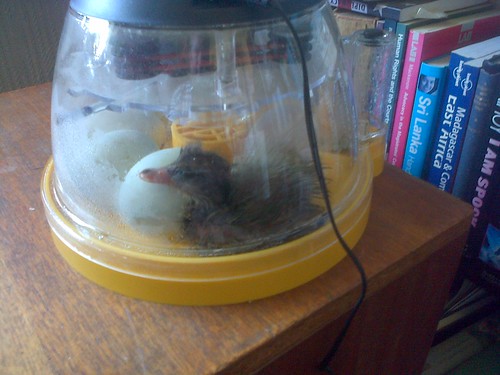One death, two ill birds, moulting and brooding chickens, a sharp drop in egg production. We are not having too good a time with our hens at the moment. On Saturday our white leghorn died suddenly. She was a lovely bird with a huge comb and she laid beautiful white eggs. Over the weekend we moved two of our hens to the back garden. One is lethargic and not eating. The other is eating well but is limping. Back on the allotment and one of our copper blacks has gone very broody. She gets up in the morning, eats and then returns to the nest box and sits on any eggs she can find. She is also moulting (as are some of the other hens). All this has contributed to s sharp drop in egg production. We normally get about 14 eggs a day. On Saturday we were down to three though we are now up to seven or eight a day.
The copper black is in for a treat. As she is brooding, and as we have lost our only hen which lays white eggs, I have ordered 6 exchequer leghorn eggs. This is a white hen with black speckles. And they lay white eggs. The eggs arrive on Friday and we will let our copper black brood them.
We grow our own food in a suburban village in the North East of England. Follow us as we keep up the battle to be self-sufficient.
Tuesday 25 June 2013
Monday 24 June 2013
Ducklings moved outside
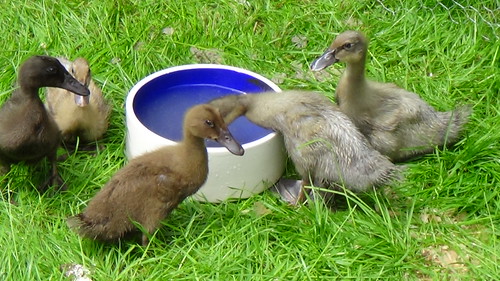
The ducklings have outgrown their brooder box so we took the decision that it was time for them to move outside into their own pen in the back garden. They moved in yesterday and will be there for a week before we move them to the allotment. They have taken well to their new situation. There was a couple of heavy showers through the day and they seemed to enjoy them!
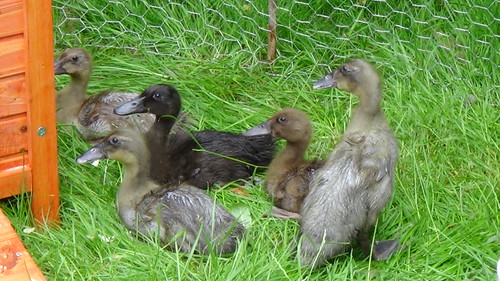
Sunday 23 June 2013
Promoting the cause
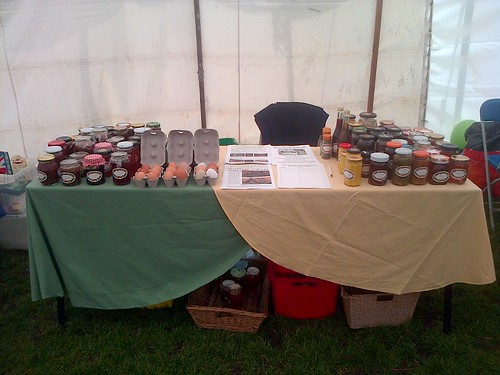
Low Fell in Gateshead was the venue for an annual fayre yesterday and I was there with preserves, eggs and leaflets to promote the cause of self-sufficiency and, in particular, to drum up business for the Allotment Cafe which we run once a month in Marley Hill Community Centre, in the next village up from where we live in Sunniside. The next cafe is on 30th June. It was a successful day, and a sell-out for the duck eggs, all of which had gone by the time I remembered to take the photo above of my stall.
Another swarm
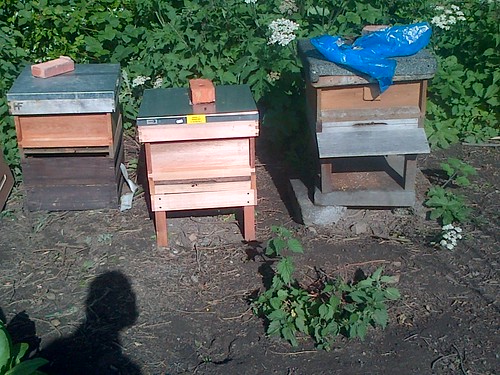
Just when I thought the swarming was over, on Friday another appeared. This time it was on the hedge, rather than in a tree. Capturing it was therefore relatively easy. I was able to drop most of the swarm into the swarm box in the early afternoon but left it overnight as we had too much on in the evening. We came back at 5.30am and rehoused the swarm in a hive - this is now our 10th. It stands alongside the other new hive and the weaker hive (though it is now looking stronger) at the bottom of the herb garden (see photo above).
Thursday 20 June 2013
Swarm rehoused
I'm just back from the allotment where, in the moonlight, we rehoused the swarm I captured this afternoon. So, Hive 9 is now in place, next door to Hive 4. I hope they are all going to be happy with their new neighbours! The bees themselves were a bit frisky. Despite wearing smocks, I was stung once. David, alas, was stung 5 times. I will check the hive (from a modest distance) tomorrow morning when I open up the hen houses.
Last year, the extreme weather conditions caused the bees to go onto swarm overdrive. I was hoping to avoid swarms this year, especially now that the weather is drier and warmer. We are having fewer this time round but when an existing queen and a large number of the worker bees leave a colony to set up home elsewhere, there are fewer bees to gather nectar and make honey. A new virgin queen in the hive needs a few days to get mated and then needs to establish herself. Nevertheless, we've got another hive from today's exploits, even if we did see a second swarm head off into the distance.
Last year, the extreme weather conditions caused the bees to go onto swarm overdrive. I was hoping to avoid swarms this year, especially now that the weather is drier and warmer. We are having fewer this time round but when an existing queen and a large number of the worker bees leave a colony to set up home elsewhere, there are fewer bees to gather nectar and make honey. A new virgin queen in the hive needs a few days to get mated and then needs to establish herself. Nevertheless, we've got another hive from today's exploits, even if we did see a second swarm head off into the distance.
Wednesday 19 June 2013
The ducklings are growing
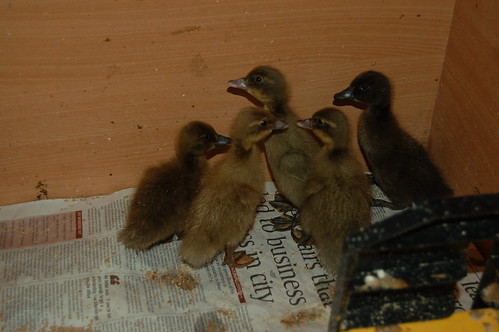
The above photo is of the ducklings that hatched at the start of the month. They were about three days old when I took the photo. Now look at the following picture of the same ducklings taken this morning, about 2 weeks later.
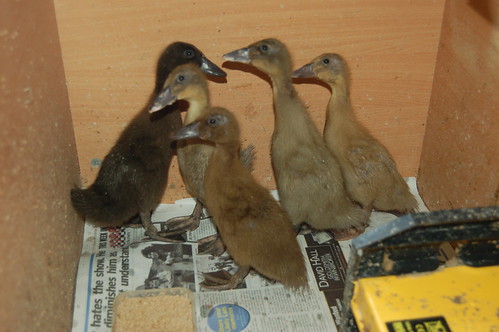
What a difference a fortnight makes! They are growing so quickly that we may have to find an even bigger brooder cage for them before we move them to the allotment where they will join their parents. Like all ducks, they are very messy and need to be cleaned out every day. They are getting through 3 or 4 tubs of duckling crumb feed a day and drink large amounts of water, getting though about 4 litres a day.
They will be making a guest appearance at the Whickham Community Festival on 29th June. There will be a medieval theme so there will be a "village duck pond" though the ducklings will be in a large cage on the grass. The following day they go to Marley Hill Community Centre's "Sunday in the Centre" event. They will be in a cage outside the building and kids will be able to enter a competition to name them.
The one that got away
I have just spent the last couple of hours dealing with two bee swarms on my allotment. The first was on a branch in an ash tree that overhangs the neighbouring allotment. It was spotted by Liz, the allotment holder, who then phoned me to tell me it was there. The second was on the hedge between the two allotments. I spotted it when I arrived. The hardest one to capture was clearly going to be the one in the tree - or so I thought. We had to get step ladders and a long handled tree pruner. At the top of the ladders and feeling very unsteady, I managed to chop off the right branch which then fell onto a sheet I had put on the ground. I then quickly poured the bees into a swarm collecting box which is still sitting on the ground, waiting for the final few bees to go in.
The hedge swarm turned out to be a different matter altogether. I shook it into a cardboard box which I them turned upside down onto a sheet. This is the usual practise when a swarm box is not available (we have only one). Quite a few bees were still flying around and I noticed that they were forming back up into a swarm on the hedge. Clearly I had failed to capture the queen in the box. I decided to leave the swarm for an hour to let it fully reform before attempting a second recovery operation.
When I returned for the second attempt, I decided it would be easier to chop off the branch of the hedge on which the swarm had formed and then shake it into the box. Alas, as I sawed into the branch, the entire swarm took to the air and headed off as a cloud, flying in what appeared to be a predetermined direction. I watched as the swarm disappeared over the hedgerows.
So whilst we are in a position to create a 9th hive, we lost the opportunity for a 10th. Whilst that is disappointing, it is not the end of the world. It is likely that the swarm had already identified a new nest site, hopefully in a hollow in a tree or some other sumilar place, rather than in a building. That said however, Sun Hill Aged Person's Unit here in Sunniside has had a feral honey bee colony living in its roof space for five years and it has been no problem to the residents.
Another feral bee colony, assuming it's not in a location that will cause difficulties for people, is no bad thing, given the loss of bees, both honey and bumble, over the past few decades. Meanwhile, this evening, we will transfer the swarm in the swarm box into a spare hive (which David is assembling now).
The hedge swarm turned out to be a different matter altogether. I shook it into a cardboard box which I them turned upside down onto a sheet. This is the usual practise when a swarm box is not available (we have only one). Quite a few bees were still flying around and I noticed that they were forming back up into a swarm on the hedge. Clearly I had failed to capture the queen in the box. I decided to leave the swarm for an hour to let it fully reform before attempting a second recovery operation.
When I returned for the second attempt, I decided it would be easier to chop off the branch of the hedge on which the swarm had formed and then shake it into the box. Alas, as I sawed into the branch, the entire swarm took to the air and headed off as a cloud, flying in what appeared to be a predetermined direction. I watched as the swarm disappeared over the hedgerows.
So whilst we are in a position to create a 9th hive, we lost the opportunity for a 10th. Whilst that is disappointing, it is not the end of the world. It is likely that the swarm had already identified a new nest site, hopefully in a hollow in a tree or some other sumilar place, rather than in a building. That said however, Sun Hill Aged Person's Unit here in Sunniside has had a feral honey bee colony living in its roof space for five years and it has been no problem to the residents.
Another feral bee colony, assuming it's not in a location that will cause difficulties for people, is no bad thing, given the loss of bees, both honey and bumble, over the past few decades. Meanwhile, this evening, we will transfer the swarm in the swarm box into a spare hive (which David is assembling now).
Self-Sufficient in Suburbia - May update
A bit late due to being on holiday last week but here is the update from May. It covers most of what we did on the allotment during the month.
Tuesday 18 June 2013
More work on the duck pond
Work continues on expanding the duck pond. Much of the pond had already been drained but this evening, I used a bucket to take out the last of the water which I poured on the potato bed. I am now down to a thick layer of mud and silt in the centre of the pond. It is rather unpleasant stuff but needs to be dug out and put on the vegetable beds. That's a job for tomorrow.
Building the polytunnel
There has been some interest in the polytunnels we bought last month (one of which is now built) - £80 each from Amazon. I filmed this video last month about why we got the polytunnels (all to do with protecting crops from the hens). Today I fimished preparing the ground for the second one. Sometime soon it will be built.
The hens are moulting
Egg yields have gone down quite a bit over the past couple of days and I discovered why tonight. I picked up one of my copper blacks and she was featherless from the crop down to the legs. I then picked up a few more of the hens and the older ones were in the same condition. It seems we have hit the moulting season and that means the hens put their energy into growing new feathers rather than laying eggs. It will take a few weeks before we get over this. Given the mountain of eggs we have from last week when we were on holiday and therefore not consuming, swapping or selling them, we should be able to get through this lean patch.
Anyway, here is a video, filmed last month but only just edited, about the feeding dandelions and other wild green leaves to the hens and ducks.
Anyway, here is a video, filmed last month but only just edited, about the feeding dandelions and other wild green leaves to the hens and ducks.
Monday 17 June 2013
Hive checks
A third job to do today was an inspection of the 4 hives in our Sunniside apiary. I guess my expectations were a bit high. I was hoping that hive 2 would have a second super filled with honey after the first super was filled in a couple of weeks in late May and early June. Alas, it was not to be. The bees are only just drawing out the comb. The good news is that hive 4, which was looking rather weak when we inspected it last month, is now looking much stronger. The colony is growing to fill the space in the hive. If this continues, we could possibly add a super in the mid-summer to collect a honey crop.
Sunday 16 June 2013
Work continues on the pond
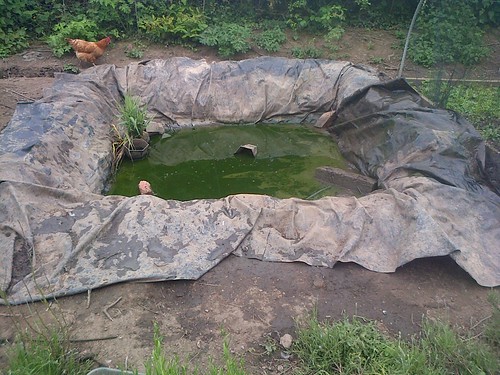
Another post-holiday job to do was to work on extending the duck pond. This photo was taken this evening after I had finished work for the day. 3 sides have now been raised. The 4th, at the front of the pond, will be raised shortly. Most of the water has now been drained. I used the pondwater on the potatoes and soft fruit bushes. Fresh water will be added once the construction and cleaning work is done. This will definitely be completed by the end of June as that is when we will bring the ducklings to the allotment.
Releasing the chicks
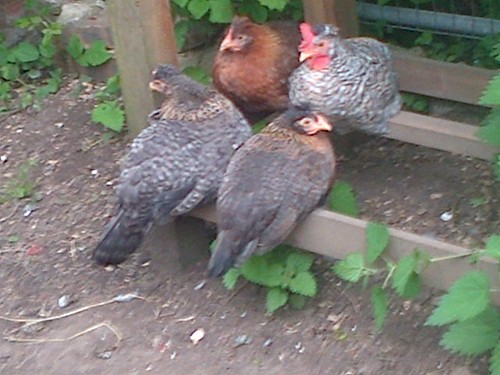
I went on holiday on 8th June and returned yesterday, 15th June. A friend looked after the livestock in our absence. One of our first jobs on getting back was to release the 4 chicks into the flock. For a few weeks, the chicks have been in their own henhouse and chicken run on the allotment. They can see the other hens but had, until today, been kept separate. We judged that they are now big enough to be integrated into the flock. That simply meant dismantling the chicken run this morning so that the chicks were free to wander across the whole allotment.
There were no fights and no bullying from the hens. This evening, when I went over to close up the henhouses, the chicks (now nearly 3 months old) were all back in their henhouse. So, that job at least went off without a hitch.
The above photo shows the 4 chicks (they stayed together as a group as they moved throughout the allotment) sitting in the rain shelter we built last year.
Wednesday 5 June 2013
Get Your Shed Together
Some of us have long argued that allotments are great for improving a person's physical health, but what about mental health? There are now one million single older men in the UK and many can fall victim to loneliness and mental health problems. Men's Health Week takes place on 10th-16th June and one project in particular in Gateshead aims to address the issue of loneliness and mental health issues in older men.
There's nothing fancy about this scheme. It's not about expensive treatments. It's not about highly paid consultants being called in to address problems. It's simple and in many ways quite traditional. It's about the power of talking, about getting people to enjoy time together. Gardeners and allotment holders are being encouraged to paint their sheds and simply invite people round for a tea and chat. It is a simple solution that can go a long way to addressing the problems of loneliness.
The person behind "Get Your Shed Together" is Gateshead's artist in residence, Gilly Rogers. She came to the Whinnies in Sunniside, my home village where I also have an allotment. I interviewed her on Monday about shed painting and what she wants to achieve but I have included below the material she sent me.
My thanks to officers at Gateshead Council for putting Gilly in touch with me.
GET YOUR SHED TOGETHER
‘Get Your Shed Together’ is a new initiative aiming to raise awareness of the health risks caused by isolation, especially for older men.
Shed owners of Gateshead are invited to give their shed a makeover and show how they can be fun and sociable spaces.
Take part in this project by decorating a shed and turning it into a welcoming place to sit and chat with a neighbour or friend. You can choose to paint your shed or fill it with different things you like, maybe it’s just a table and chairs or a pair of curtains - maybe it can be transformed into a mini exhibition space? How creative can you be in adapting your shed?
The idea for the project is to get as many people as possible decorating their sheds and inviting someone to share a chat, in the lead up to and during Men’s Health Week, 10 – 16 June.
During Men’s Health Week, Gateshead Council’s Artist in Residence, Gilly Rogers, will be in Gateshead with her pop-up shed, chatting to people and encouraging everyone to take part in the project, which she hopes will evolve into an annual event. Watch out for updates about venues where you can join us on the Our Gateshead website.
We need you to help by simply being a good neighbour. Social isolation and loneliness is increasing and is affecting people’s health. For the first time the numbers of lone-dwelling older men has reached around one million. Loneliness and social isolation have been linked to raised blood pressure, poor physical health and mental ill-health including depression, suicide and dementia. Loneliness can contribute to a higher risk of disability, poor recovery from illness and early death. Health professionals consider the health risk associated with social isolation is comparable with that of cigarette smoking and obesity.
YOU CAN HELP …
Find out more on www.ourgateshead.org/GetYourShedTogether.
Become part of our network by contacting Gilly or emailing photos of you with friends or family in your decorated shed to gillyrogers@googlemail.com.
So please start decorating your shed and have fun!
We are waiting to hear from you.
5 ducklings in total
The five ducklings hatched yesterday turned out to be the final total. So, two eggs failed to hatch. As is the usual practice, the ducklings were to be kept in the incubator for 24 hours. However, when I got home this afternoon, I found that they had managed to push off the cover of the incubator which was sitting upside down on the floor with four of them sitting in it! One of the ducklings was sitting by itself on the floor. So, I rapidly set up the brooder cage and placed them in it. It will be home for the next month after which they will be moved over to the allotment where they will live with the adult ducks and drakes (which just happen to be their actual parents).
Monday 3 June 2013
The ducklings are hatching
Extending the duck pond
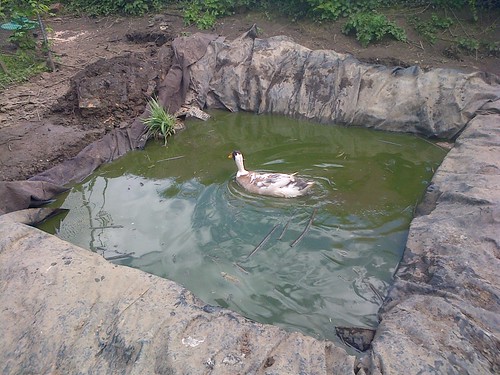
The imminent arrival of our ducklings has concentrated our attention on the duck pond. It was dug initially as a wildlife pond two years ago and by this time last year it was full of newts and frogs. Within a couple of weeks of getting the ducks in September, they had wrecked it. Ducks are messy and eat all pond plants. All wildlife has abandoned it other than a great deal of algae. It needs to be drained and cleaned but before we do that we are going to increase its volume. More ducks will be using it once we introduce our ducklings (read the following blog post) to the allotment.
We cannot dig outwards from the pond except on one side, given the constraints of space. And even on that one side, we are only going to extend it by about 15cm. We cannot dig deeper as the bottom of the pond is on thick, heavy, solid clay. The solution is to raise the sides of the pond, using material I am currently digging out of the ground to create our final drainage channel. There is plenty of pond liner around the edge of the pond which can go over the extra material. We should be able to increase the water depth by at least 30cm. It will mean a bigger volume of water, suitable for the greater number of ducks.
You can see on the above photo that we have already raised the far side of the pond. On the photo below, we have deposited some of the material on the 2nd side. An interesting point is that the ducks are now much tamer than they were last year when we first got them. Then they always moved away from us. Now, when they see us digging, they come over to investigate and grab any worms they find.

Sunday 2 June 2013
New chick run
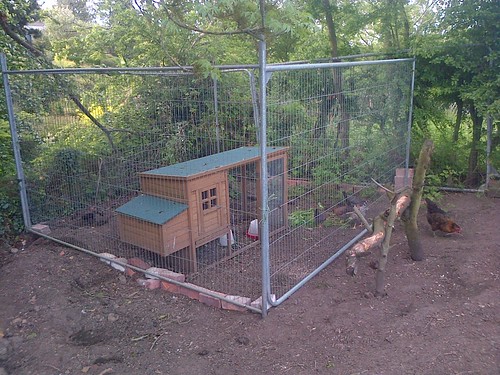
At the start of May we put the chicks into a new henhouse that had a small, enclosed run. This was the first step towards incorporating the chicks into our flock of hens. Today we built a temporary fence around the chicks' henhouse to create a larger run and give them experience of being properly outdoors. They took readily to their new space. In a couple fo weeks, we will remove the fencing and allow them to mix with the other hens.
Ducklings about to hatch
Last night it seemed that some at least of the seven duck eggs we put in the incubator were about to hatch. We could hear chirping coming from the eggs and a tapping sound, as if the ducklings were trying to peck their way out. There was even a little hole in the shell of two of the eggs where the duckling inside had pecked through. So we went to bed expecting to see hatched ducklings this morning. Alas, there were none.
We checked our books for answers. The eggs are actually due to hatch on Tuesday but is seems the hatching process can start a couple of days before the due date when some ducklings knock a small hole in the shell but otherwise leave the full break out until the final day.
So we await Tuesday and the pitter-patter of tiny little webbed feet.
We checked our books for answers. The eggs are actually due to hatch on Tuesday but is seems the hatching process can start a couple of days before the due date when some ducklings knock a small hole in the shell but otherwise leave the full break out until the final day.
So we await Tuesday and the pitter-patter of tiny little webbed feet.
Hive check
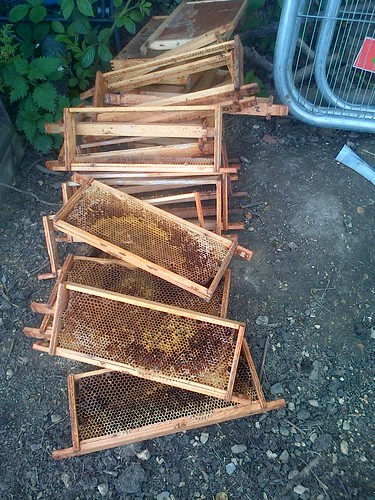
One of the jobs for today was to do a check on the four hives we have at our apiary in Whickham, in a firend's back garden. Three of the hives were fine though two are messed up inside because of the way we set them up last year. We made the mistake of giving the bees an empty space in the hive which they promptly filled with wild comb. There's nothing much we can to to sort this out but we added queen excluders and supers to these three. The fourth is a bit weaker and is a possible candidate to merge with the weak hive we have in Sunniside. We will monitor it for a few more weeks and then take a decision.
We had to sort out supers and frames to add to the hives and in the process decided to clear out some old frames we got in the supers we bought at auction in April. They are pictured above and they will be burnt at some point on the incinerator. We spotted wax moth on some of them so we don't want to introduce that to our own hives. The supers will not be burnt but will be used by us - but only after we have used a blow otrch on them to kill any unwanted bugs.
Meanwhile, I am delighted to report that the strongest hive at our apiary in Sunniside is close to filling with honey the super we put on two weeks ago. It is not yet capped but that will not be something the bees will put off for much longer. After the disaster of last year, I have been amazed at the speed at which this hive, formed from one of last year's swarms, has produced so much honey so quickly.
Subscribe to:
Posts (Atom)
